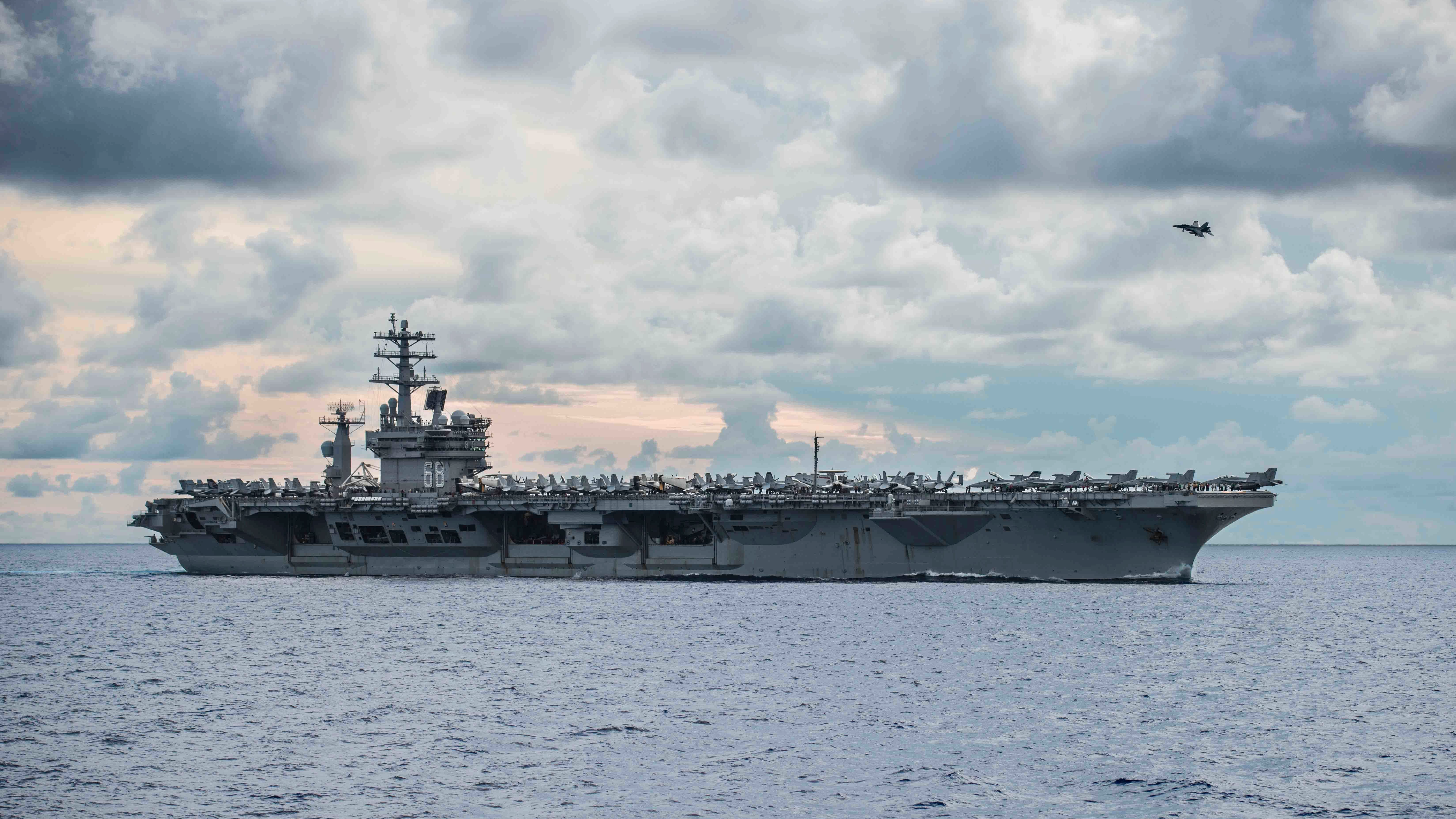
In this photo provided by U.S. Navy, USS Nimitz (CVN 68) steams alongside the Navy's only forward-deployed aircraft carrier USS Ronald Reagan (CVN 76, not in photo) in the South China Sea, July 6, 2020. /U.S. Navy via AP
In this photo provided by U.S. Navy, USS Nimitz (CVN 68) steams alongside the Navy's only forward-deployed aircraft carrier USS Ronald Reagan (CVN 76, not in photo) in the South China Sea, July 6, 2020. /U.S. Navy via AP
Editor's note: Li Yun is a researcher at the Institute of Foreign Military Research of the Department of War Research, China's People's Liberation Army (PLA) Academy of Military Sciences. The article reflects the author's opinions, and not necessarily the views of CGTN.
This year marks the 70th anniversary of the outbreak of the War to Resist U.S. aggression and Aid Korea. Regarding the war, U.S. General Matthew Ridgway reluctantly stated that he was the first commander in American history to sign an armistice agreement that did not win. One of the main reasons why the U.S. general had to sign it was that the U.S. government made a strategic misjudgment about the possibility of China sending troops to DPRK.
Throughout the history after World War II, there are still two wars related to America's strategic misjudgment on China.
One is the Chinese People's Liberation War. Knowing that the Chiang Kai-shek government was "a politically bankrupt regime," the U.S. still made a strategic misjudgment that the Kuomintang could defeat the Communist Party by its military superiority.
The other is the Vietnam War. Under the background that China has just experienced three years of natural disasters and that relations between China and the Soviet Union had deteriorated, the U.S. made a strategic misjudgment that China did not dare to send troops to aid North Vietnam. The outcome of these two wars is that the U.S.-supported sides lost both wars.
Since the normalization of relations between China and the U.S. and the implementation of China's reform and opening-up policy, the overall relation between the two countries has been close and their cooperation becomes extensive.
However, in recent years, especially after Trump took office, the U.S. has pressed China on economic, political, military, and technological issues, and it even shifted its responsibility for poor response against the COVID-19 pandemic to China. In this context, the U.S. is once again making wrong strategic judgments on China, and thus the possibility of a miscalculation that could lead to a military conflict between China and U.S. has become a hot topic.
Some believe that the reasons why the U.S. would make strategic misjudgments again are as follows: First, the huge ideological differences still exist; second, the gap in comprehensive strength has narrowed, which makes the U.S. begin to doubt China's policy; third, the U.S. has cognitive errors in China's strategic thinking mode and intentions.

The memorial medal presented to living Chinese veterans to mark the 70th anniversary of the Chinese People's Volunteers (CPV) army entering the Democratic People's Republic of Korea (DPRK) in the War to Resist U.S. Aggression and Aid Korea. /Xinhua
The memorial medal presented to living Chinese veterans to mark the 70th anniversary of the Chinese People's Volunteers (CPV) army entering the Democratic People's Republic of Korea (DPRK) in the War to Resist U.S. Aggression and Aid Korea. /Xinhua
Will the U.S. political elites misjudge China's strategic intentions as it did during the Cold War and Korean War? After more than four decades of development, the United States should clearly recognize China's core interests.
China has implemented a reform and opening-up policy and actively integrated into the globalization system initiated by the West for more than 40 years. China has published white papers on national development strategy and military construction, and openly expounded the concept of peaceful development and win-win cooperation around the world.
If the strategic misjudgment would occur, it can only be said that the political elites in the U.S. are pretending to be confused and some of them have inherent Cold War and hegemonic narratives. It is not China's strategic intention but the structural contradiction between China's growing strength and U.S. unipolar hegemony that causes the U.S. strategic suspicion.
Under such circumstances, in order to avoid another "strategic misjudgment" on China by American political elites, on the one hand, it is necessary to strengthen non-governmental exchanges, so that more ordinary Americans can understand the real situation in China.
On the other hand, it is more important for China to continue to enhance its comprehensive national strength through peaceful development, to deter and stop the possible wrong decisions of the U.S. government. The history of the War to Resist U.S. Aggression and Aid Korea shows that only strength can force the opponent to sit at the negotiating table.
China has always adhered to the concept of peaceful development. Even if there is a risk of military conflict between China and U.S., it can only be caused by U.S. provocation.
Since U.S. cannot have a strategic misjudgment on China, then U.S. will not take the initiative to provoke large-scale military conflict or military conflict of low or medium intensity.
This is because, first of all, U.S. knows that China is a world power with nuclear weapons, and there will be no winner in a large-scale conflict between two world powers with nuclear weapons. Second, both China and U.S. are in a critical period of national development. Once a military conflict of low or medium intensity breaks out, there would be a great chance that it would escalate to a large-scale military conflict.
The United States is most likely to choose those areas where tensions between China and the United States continue to heat up, where the two sides have sufficient pretensions, and where the sensitive points of a third party are not involved to create friction. The excuse is likely to be a misoperation. By doing so, it can, to some extent, create regional tensions that serve the interests of the U.S. government. At the same time, it also gives both sides an excuse to make concessions, which is conducive to managing the crisis.
Therefore, the risk of military conflict between China and U.S. is fundamentally under control.
(If you want to contribute and have specific expertise, please contact us at opinions@cgtn.com.)